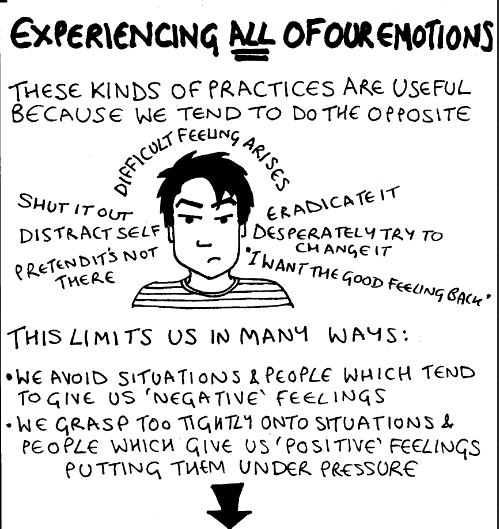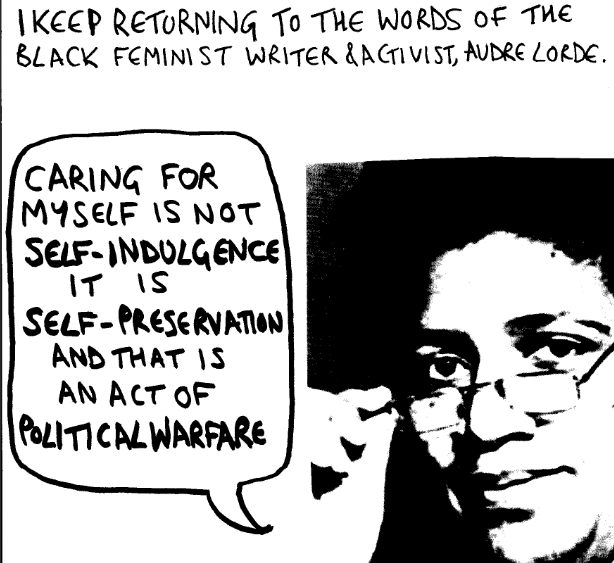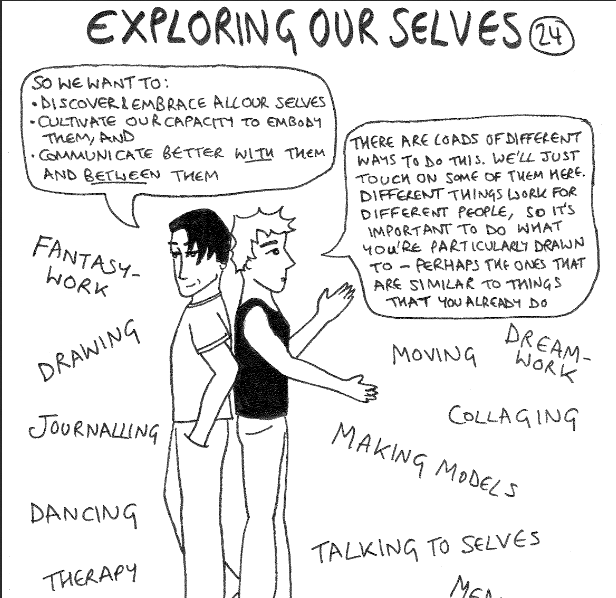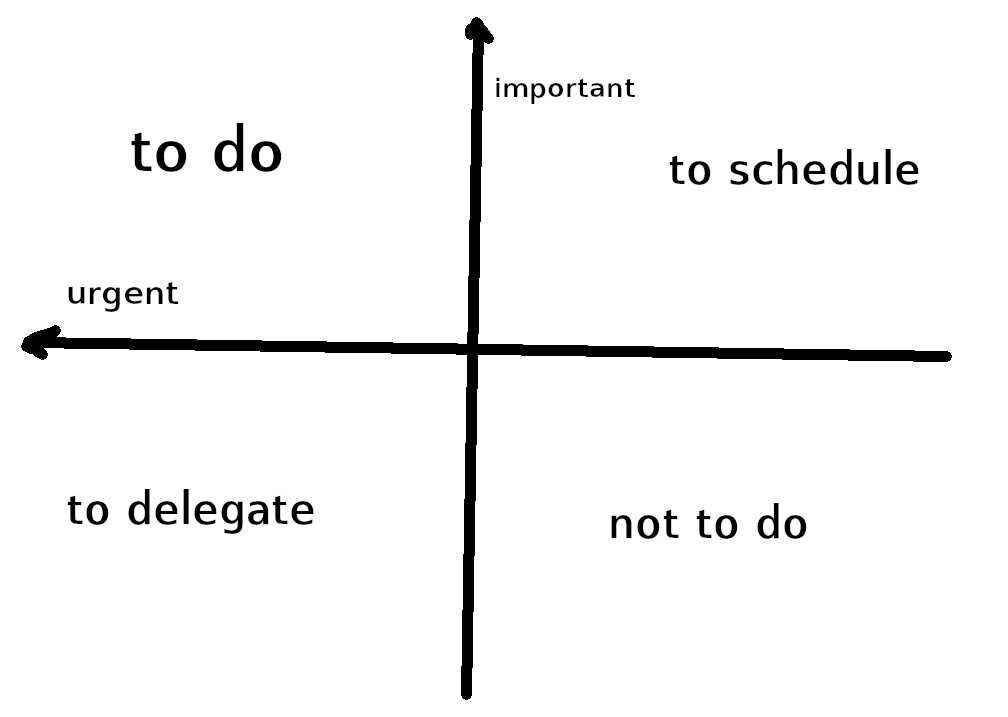https://www.rewriting-the-rules.com/wp-content/uploads/2017/12/PluralSelvesZine.pdf
“Structural Conflict” — And Six Ways to Reduce It
Extract from:
Creating a Life Together Practical Tools to Grow Ecovillages and Intentional Communities – Diana Leaves
1. Identify your community vision and create vision documents
2. Choose a fair, participatory decision-making process appropriate for your group. And if you choose consensus, get trained in it.
3. Make clear agreements — in writing. (This includes choosing an appropriate legal entity for owning land together)
4. Learn good communication and group process skills. Make clear communication and resolving conflicts a priority.
5. In choosing cofounders and new members, select for emotional maturity.
6. Learn the head skills and heart skills you need to know.
Community founders must cultivate both heart skills and head skills.. This means learning how to make fair, participatory group decisions; how to speak from the heart; how to face conflict when it arises and deal with it constructively; and how to make cooperative decisions and craft fair agreements. It means learning how to create budgets, timelines, and strategic plans; and how to evaluate legal entities for land ownership or business or educational activities. It means learning the real estate market in your desired area,local zoning regulations, and, if needed, how to secure loans with reasonable terms. It means learning how to structure healthy and affordable internal community finances. It means learning about site planning and land development. It means doing all this with a sense of connection and shared adventure. Plunging into the land-search process or trying to raise money without first understanding these interrelated areas is a sure invitation to trouble.
Community founders tend to be specialists, but in fact they must be generalists. I’ve seen founders with spiritual ideals and compelling visions flounder and sink because they have no idea how to conduct a land search or negotiate a bank loan. I’ve seen founders with plenty of technical or business savvy — folks able to build a nifty composting toilet or craft a solid strategic plan — who didn’t know the first thing about how to speak honestly and from the heart to another human being. And I’ve seen sensitive spiritual folks as well as type-A “get-the-job-done” folks crash and burn the first time they encountered any real conflict.
Actions and priority matrix
This matrix id usefull to organize the stuff to do alone or in group and come from a military strategy. It’ s famous with the name of Eisenhover’s matrix.
I dont like that man, but I find the matrix usefull to think cleaner and act faster and in group.
It’s also really simple:
A way to use it in a group is using to create the list of the day of the topics to speak in a assembly. If the meeting is really full of topics, this matrix helps group to decide what speak in the plenary assembly and what delegate to sub group, these subgroups managing urgent topics will have autonomy to decide and do. with the agreement to do a report to the central assembly and taking their responsability about the topic.
Power, Privilege and Rank
 Fonte: https://www.zegg-forum.org/images/PDF/Texte-Englisch/Rank-short.pdf
Fonte: https://www.zegg-forum.org/images/PDF/Texte-Englisch/Rank-short.pdf
NOTE: not stop you reading at C, is really more scientific of what seems there.
Power, Privilege and Rank
In order to understand power more deeply, it is important to explore the factors and privilegesthat allow us to lay claim to power. Mindell (1995) provides a useful map for exploring thefactors leading to power. These factors can be considered as privileges. He maps theseprivileges according to a ranking system. He defines rank as the “sum of a person’s privileges”(1995, p.28) and sees it as a “conscious or unconscious, social or personal ability or powerarising from culture, community support, personal psychology or spiritual power.” (1995, p.42)Depending on your position relative to others, you might have higher or lower rank on anattribute. The more rank you have, the more access you have to privilege and power in this area.
Rank is not always earned. The rank of being white in South Africa was an unearned privilegethat I was not always aware of, but from which I benefited greatly and which assisted me indeveloping other rank benefits such as education and greater material comforts. Frequently,having rank in some areas allows the easier development of rank in other areas. The inverse can also be true. When we have rank in one particular area we might tend to rely on this rankand so not develop in other areas.
Categories of Rank
a. Social Rank
This form of rank is the ranking bestowed by the culture and society we live in. It embracesthe value system as well as the biases and prejudices of the mainstream society, andbestows more privileges to some people and less to others.
b.Psychological Rank
Psychological rank occurs when you have developed internal resources and abilities so thatyou have greater personal comfort and ease in addressing challenging situations.
•This development might arise from personal psychological work where a greater familiaritywith yourself in difficult life challenges occurs.
•Psychological rank might also arise in learning skills to deal with having lower social rankand managing in the world under this condition.
c. Spiritual RankSpiritual rank comes from a relationship to something divine or transcendent–gods,goddesses or spirits. It can occur naturally through personal spiritual training, or as a result ofa reaction to having lesser social and psychological rank. It does not necessarily arise fromreligious practice or training, but rather from a connection to a divine or transcendental statewhich creates a detachment and experience of freedom outside of the wheel of ordinary life.
d. contextual rank
Each community or group has its own value system. Rank in a local context comes fromhaving those qualities that have currency in the community. In many contexts, being popular,well-connected, an insider or old-timer gives one local rank. e. Internal rankingEffects of oppression are not only external but also change our inner landscape. We mightvalue certain qualities or tendencies more then others. Outer oppression can lead tointernalized oppression. We have a form of inner ranking between different parts of us thatoften represents a set of mainstream values.
Recognizing and Using Rank and Power
Eldership and the Use of Rank
Rank, privilege and power exist. Attempts by some to eliminate a ranking system and therebyreduce power and its abuses has not been successful. We live in a world where rank isevident and is in use all the time. The challenge we have is to use the rank we have well. Theeffective use of rank has the potential to transform ourselves and those around us. Even ifdone on a small scale, using rank well changes the world in which we live.
Recognizing Rank
Mindell states that rank is a drug. The more you have, the less aware you are of how it effectsothers negatively. When we use it poorly, we suffer, our relationships with others suffer andwe create an unhappy world around us. Recognizing that we have rank might sound simple,but it is a challenging process. Most of us recognize the places where we might not haverank. The misuse of rank results in difficult relationship interactions and conflicts, particularly withthose who do not have this rank and are suffering through our unconscious use of rank overthem. Frequently those who are in less powerful positions know more about who has rankand the effects of rank and power than those who wield this rank.
Using Rank
Once we recognize rank we are in a much easier place to use it consciously, with wisdom andcare for ourselves and others. The use and misuse of rank is often extremely subtle and ouropenness to those who might be subjected to it and their feedback is important.Effective use of social rank: There are many examples of people who have used social rankwisely. Nelson Mandela (1994a) is a good current example.Effective use of spiritual rank: The life of Martin Luther King Jr. (1998) is a testament to theeffective use of spiritual rank. In a period in the history of the United States where people ofcolor were denied equal rights, he focused not only on the suffering of his people, the AfricanAmerican people, but on his vision of equality for all.
Understand feeling and take care of themself
Two beautifull fanzines!
Staying with our feelings

https://rewriting-the-rules.com/wp-content/uploads/2016/11/StayingWithFeelingsZine.pdf
and
Hell yeah, selfcare!

https://rewriting-the-rules.com/wp-content/uploads/2017/02/HellYeahSelfCare.pdf



